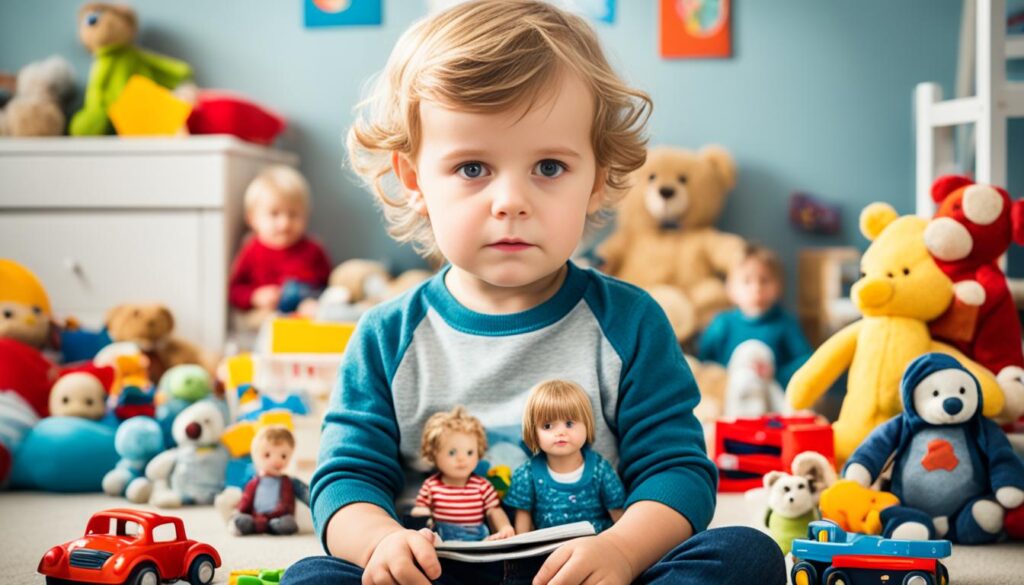Did you know that over 1 million children in the United States are caught up in the complexities of their parents’ divorces each year?
Going through a divorce can be a traumatic experience for children, as they often feel that their whole world has turned upside down. It is important for parents to prioritize their children’s well-being during this challenging time by providing reassurance, stability, and support. Effective communication, maintaining routines, addressing children’s emotions, and seeking professional help are all important strategies in helping children navigate the emotional and practical challenges of divorce.
Key Takeaways:
- Over 1 million children in the United States are caught in the middle of divorce every year.
- Prioritize your children’s well-being by providing reassurance, stability, and support during divorce.
- Effective communication, maintaining routines, addressing children’s emotions, and seeking professional help are important strategies in helping children navigate divorce.
- Maintain open and honest conversations with your children about the divorce, using age-appropriate explanations.
- Help your children grieve the divorce by encouraging them to share their feelings and reassuring them of your continuing love and support.
How to Tell Kids about Divorce
When it comes to telling your children about the divorce, honest communication is essential. It’s important to anticipate tough questions and be prepared to provide simple and truthful explanations that are kid-friendly. Reassure your children that your love for them hasn’t changed and let them know what changes to expect in their lives. By presenting a united front with your ex-spouse, agreeing on an explanation, and planning your conversations in advance, you can provide a sense of stability and clarity during this challenging time.
Being age-aware is crucial when discussing divorce with your children. Tailor the information you provide to their age level, using language and concepts that they can grasp. Avoid overwhelming them with unnecessary details or burdening them with adult issues. Keep the focus on their well-being and reassure them that their feelings and concerns are valid.
“Mom and Dad have decided to live in separate homes. We love you very much, and that will never change. While we won’t be living together anymore, we will both still be your parents, and we will always be there for you.”
Remember, honest and open communication is key throughout the entire process. Encourage your children to express their emotions and let them know it’s okay to feel sad, angry, or confused. Listen to their concerns and provide reassurance. By fostering an environment of trust and understanding, you can help your children adjust to the changes and navigate their feelings more effectively. Divorce can be difficult, but with honest and compassionate communication, you can support your children through this transition.
Expert Tip:
Consider using visual aids, such as drawings or books, to help younger children understand the concept of divorce. These resources can provide a visual representation of the situation and facilitate their comprehension.
Helping Your Child Grieve the Divorce
Divorce can be a significant loss for children, and it is important to help them grieve and adjust to the new circumstances. Encouraging them to share their feelings, helping them find words for their emotions, and letting them be honest are crucial in this process. Offering ongoing conversations and acknowledging their feelings can help them understand and process their emotions. It is important for parents to address any misconceptions or guilt that children may have about the divorce and reassure them of their continuing love and support.
“Helping children cope with the emotions surrounding divorce is essential for their well-being. By creating a safe and open space for them to express themselves, parents can provide the necessary support during this challenging time.”
One effective way to help your child grieve the divorce is by encouraging open and ongoing conversations. By creating a safe and non-judgmental environment, your child will feel comfortable expressing their feelings and concerns. Often, children may struggle to find the right words to describe their emotions. As a parent, you can help them by providing them with a vocabulary to express their feelings. Encourage them to use words like “sad,” “angry,” or “confused,” and let them know that it is normal to experience a range of emotions.
Additionally, it is crucial to acknowledge their feelings and let them know that their emotions are valid. By doing so, you are helping them understand that it is okay to feel upset or angry about the divorce. This validation will provide them with a sense of comfort and reassurance.
Addressing misconceptions and guilt is another essential aspect of helping your child grieve the divorce. Children often feel responsible for their parents’ separation and may carry a sense of guilt. As a parent, it is important to have open discussions with your child, explaining that the divorce is not their fault. Reassure them that both parents love them unconditionally and that the separation has nothing to do with their behavior or actions.
Remember that grieving the divorce is a process that takes time. Offer continuous support, be patient, and encourage your child to express their emotions. By providing this support, you are helping them cope with the difficult emotions and navigate their way through the challenges that come with divorce.

Quotes
“The emotional well-being of children during divorce should be a top priority. By addressing their grief, providing support, and assuring them of your love, parents can help their children navigate the challenges that come with divorce.”
– Dr. Jane Simmons, Child Psychologist
Tips for Helping Your Child Grieve the Divorce
- Encourage open conversations: Create a safe space for your child to share their feelings and concerns.
- Provide a vocabulary: Help your child find words to express their emotions, such as sad, angry, or confused.
- Acknowledge their feelings: Let your child know that it is normal to feel upset or angry about the divorce.
- Address misconceptions and guilt: Reassure your child that the divorce is not their fault and that they are loved by both parents.
By implementing these strategies, you can support your child through the grieving process and help them adapt to the changes brought about by the divorce.
Coping Strategies for Helping Your Child Grieve the Divorce
| Strategy | Description |
|---|---|
| Encourage Expression | Provide a safe and supportive environment for your child to express their emotions openly and honestly. |
| Validate Feelings | Acknowledge your child’s emotions and let them know that their feelings are valid and normal. |
| Address Guilt | Have conversations with your child to dispel any misconceptions or guilt they may have about the divorce. |
| Offer Reassurance | Remind your child that they are loved unconditionally by both parents and that the divorce is not their fault. |
| Provide Professional Help | Consider involving a child therapist or counselor who specializes in helping children cope with divorce. |
Providing Stability Through the Divorce
Divorce brings significant changes, and it is important to prioritize stability and routine for children during this challenging time. Maintaining a sense of stability can help children feel more secure and grounded amidst the changes they are experiencing. Establishing consistent schedules, routines, and boundaries can provide a sense of stability and normalcy, which is crucial for their emotional well-being.
Children benefit greatly from knowing what to expect and having a sense of structure in their daily lives. By maintaining familiar routines, such as consistent meal times, bedtimes, and after-school activities, parents can help provide a stable environment for their children. This can help alleviate some of the uncertainty and anxiety that often accompanies divorce.
It is also important for parents to resist the temptation to spoil or enable their children during this time. While it may be tempting to give in to their every desire, providing discipline and enforcing limits can contribute to a sense of structure and stability. Consistency in parenting approaches can help children understand that even though their family circumstances may be changing, certain expectations and boundaries remain the same.
Benefits of Stability During Divorce
Maintaining stability and providing structure during divorce can have numerous benefits for children:
- Emotional well-being: Stability can help children feel more secure and reduce feelings of anxiety and stress.
- Sense of normalcy: By maintaining routines, children can have a sense of familiarity and normalcy in their lives, which can provide comfort and stability.
- Predictability: Knowing what to expect can help children feel more in control of their lives and reduce feelings of uncertainty.
- Continued development: Consistency allows children to continue with their regular activities, such as school, extracurriculars, and social interactions, supporting their overall development.
By prioritizing stability and maintaining routines, parents can provide a sense of security and stability for their children during the challenging process of divorce.
Maintaining Stability Through Routines
| Benefits | Strategies |
|---|---|
| Emotional well-being | Provide a consistent daily routine with regular meal times, bedtime, and homework schedules. |
| Sense of normalcy | Encourage participation in familiar activities and hobbies. |
| Predictability | Communicate any changes well in advance and provide explanations to help children understand and adjust. |
| Continued development | Support children’s involvement in school, extracurricular activities, and social interactions. |

Taking Care of Yourself
During a divorce, it’s essential to prioritize self-care to ensure you can support your children effectively. Taking care of your own well-being is not selfish but rather a necessary step. By prioritizing self-care, you can better navigate the emotional challenges and stress that come with divorce.
Exercise Regularly
Engaging in regular physical activity is an excellent way to relieve stress and boost your mood. Make time for exercise, whether it’s going for a walk, practicing yoga, or joining a fitness class. Physical activity releases endorphins, which can help reduce feelings of anxiety and depression.
Eat a Healthy Diet
A healthy diet plays a vital role in your overall well-being, providing the necessary nutrients to support your physical and emotional health. Focus on consuming nutritious foods such as fruits, vegetables, whole grains, and lean proteins. Avoid excessive consumption of processed foods, sugary snacks, and alcohol, as they can negatively impact your mood and energy levels.
Seek Support from Friends and Family
Don’t hesitate to lean on your support network during this challenging time. Reach out to trusted friends and family members who can offer emotional support and a listening ear. Talking about your feelings and experiences can help alleviate stress and provide a fresh perspective.
“Taking care of yourself during divorce is not selfish, but rather a necessary step to ensure you can support your children effectively.”
Keep a Journal
Journaling can be a therapeutic practice that allows you to process your emotions and thoughts. Write down your feelings, concerns, and triumphs as you navigate through the divorce. Not only does it provide an outlet for self-expression, but it can also help you gain clarity and insight into your emotions.
Take Time for Yourself
Amidst the challenges of divorce, remember to carve out time for self-care. Engage in activities that bring you joy and help you relax. Whether it’s reading a book, taking a warm bath, or pursuing a hobby, prioritize activities that recharge and rejuvenate you.
Seek Professional Help if Needed
If you find yourself struggling to cope with the emotional impact of divorce, don’t hesitate to seek professional help. A therapist or counselor can provide guidance, support, and coping strategies tailored to your specific needs. They can offer valuable insights and help you prioritize your well-being during this transitional period.

By taking care of yourself, you are better equipped to navigate the complexities of divorce and provide the support your children need. Remember, prioritizing your well-being is essential for your overall resilience and ability to be there for your family.
Emotional Impact of Parental Separation
Parental separation can have a profound emotional impact on children. They may experience a range of complex emotions, such as sadness, confusion, and even anger.
It is crucial for parents to create a safe and open environment where children can express their feelings without judgment. Encouraging them to talk about their emotions and acknowledging the validity of their experiences can help them process their feelings and feel supported throughout the divorce process.
Seeking professional help can also be beneficial, providing children with additional support and guidance during this emotionally challenging time. Therapists specializing in child psychology can help children develop healthy coping mechanisms and navigate the complexities of parental separation.
“Children may experience a rollercoaster of emotions during parental separation. By offering them a safe space to express themselves and seeking professional assistance, parents can play a vital role in helping them cope and adjusting to their new reality.”
Children’s emotions during divorce should be treated with sensitivity and care. It is important to reassure them that their feelings are valid and that they are not alone in their experiences. By addressing their emotional needs, parents can help their children build resilience and navigate the challenges of parental separation.

| Common Children’s Emotions During Divorce | Ways to Support Children’s Emotional Well-being |
|---|---|
| Sadness |
|
| Confusion |
|
| Anger |
|
Developmental Changes in Family Structure and Dynamics
Divorce brings about significant changes in the structure and dynamics of a family. These changes can be challenging for children to navigate and adjust to. As the family unit undergoes transformations, children may experience a sense of loss and confusion, grappling with their changing roles and relationships.
To help children cope with these developmental changes, it is essential for parents to recognize and acknowledge their feelings and concerns. Creating a safe and supportive environment where children can openly express themselves is crucial. By encouraging open communication, parents can better understand their children’s perspectives and address any worries or anxieties they may have.
Consistency is another key factor in helping children adjust to the new family dynamics. Establishing routines and maintaining a sense of stability can provide children with a sense of security amidst the changes. Consistent rules and expectations across households can also help children feel a sense of continuity and predictability.
Professional guidance can be invaluable in navigating the challenges and complexities of post-divorce family dynamics. Seeking the support of therapists, counselors, or support groups can provide parents and children with tools and strategies to foster healthy relationships and coping mechanisms.
It’s important to note that every family’s experience is unique, and there is no one-size-fits-all approach. Each child will have their own individual response to the changes brought about by divorce. Empathy, patience, and understanding are crucial in supporting children as they navigate the ups and downs of adjusting to new family dynamics.
Impact on Children
The impact of divorce on family dynamics can be significant for children. They may experience a range of emotions including sadness, anger, and anxiety as they come to terms with the changes in their family structure. These emotions may manifest in various ways, such as changes in behavior, academic performance, or social interactions.
The effects of divorce on children can be both short-term and long-term. In the short-term, children may exhibit signs of stress, confusion, or difficulty adjusting to the new family dynamics. However, with proper support and guidance, children can often adapt and thrive in their new circumstances.
In the long-term, the impact of divorce on children’s development and well-being will depend on various factors, including the level of conflict between parents, the quality of co-parenting, and the overall support system available to the child. Research has shown that children from divorced families can go on to lead fulfilling and successful lives when provided with the necessary emotional support and stability.

| Positive Aspects | Negative Aspects |
|---|---|
| Opportunity for personal growth and resilience | Emotional challenges and adjustment difficulties |
| Development of empathy and understanding | Increased risk of behavioral problems |
| Adaptability and flexibility | Potential impact on academic performance |
It is essential for parents to be aware of the potential impact of divorce on their children and take proactive steps to provide the necessary support. Engaging in open and honest conversations, seeking professional help when needed, and prioritizing the well-being of the entire family can help mitigate the negative effects and foster positive developmental outcomes.
Conflict Between Parents and Its Impact on Children
Conflict between parents during divorce can have a profound impact on children’s emotional well-being. Witnessing parental conflict can cause feelings of fear, anxiety, and even guilt, putting children in the middle of the turmoil they did not ask for.
It is crucial for parents to minimize conflict and create a supportive environment that prioritizes their children’s well-being. Effective communication is key in reducing conflict and establishing a co-parenting relationship that focuses on the best interests of the children. By maintaining open lines of communication, parents can work together to make decisions and resolve conflicts without involving their children.
The Importance of Minimizing Conflict
Minimizing conflict is essential for children’s emotional and psychological well-being during and after divorce. Studies have shown that high levels of parental conflict have long-lasting negative effects on children’s mental health, academic performance, and future relationships. By minimizing conflict, parents can provide their children with a sense of stability and security during this challenging time.
“Children should never be exposed to the full extent of their parents’ conflicts or disagreements. Shielding them from hostility is crucial for their healthy emotional development.”
Effective Strategies for Minimizing Conflict
Here are some strategies that parents can employ to minimize conflict during and after a divorce:
- Communicate calmly and respectfully: Avoid heated arguments in front of the children and communicate in a calm and respectful manner. Use “I” statements to express your own feelings and concerns without blaming or criticizing the other parent.
- Focus on the children’s well-being: Make decisions based on what is in the best interests of the children. Keep their needs, routines, and stability as the top priority.
- Seek professional help: If communication and conflict resolution become challenging, consider seeking the help of a family therapist or mediator who can guide you through the process and provide valuable insights and strategies.
By actively working towards minimizing conflict, parents can create a healthier environment for their children, ensuring their well-being and emotional stability.

Conclusion
Divorce can be a challenging and emotional journey for children. However, by providing the right support and strategies, they can navigate this difficult process and emerge resilient. The well-being of children in divorce should be the top priority for parents, and there are several key ways to ensure their stability and emotional health throughout the transition.
Firstly, open communication is crucial. Creating a safe space for children to share their feelings and concerns can help them process their emotions. Encouraging them to express themselves freely and addressing any misconceptions or guilt they may have about the divorce can make a significant difference in their well-being.
Equally important is providing stability. Keeping consistent routines and boundaries can help children feel secure amid the changes. This includes establishing regular schedules and maintaining discipline to provide a sense of normalcy in their daily lives.
Additionally, seeking professional help can be invaluable in supporting children through divorce. Therapists or counselors can offer guidance and provide the necessary tools to help children cope with their emotions effectively. Parents should not hesitate to reach out for assistance when needed.
FAQ
How do I tell my kids about the divorce?
When telling your children about the divorce, it is important to be honest but kid-friendly in your explanation. Use simple and truthful statements to help them understand. Reassure them that your love for them hasn’t changed and let them know what changes to expect in their lives. Present a united front with your ex-spouse, agree on an explanation, and plan your conversations in advance. Be age-aware and provide age-appropriate information.
How can I help my child grieve the divorce?
Encourage your child to share their feelings and emotions. Help them find words to express their emotions and let them be honest about their experiences. Offer ongoing conversations and acknowledge their feelings. Address any misconceptions or guilt they may have about the divorce and reassure them of your continuing love and support. Seeking professional help can also be beneficial in providing additional support and guidance.
How can I provide stability for my child during the divorce?
Establish consistent schedules, routines, and boundaries to provide a sense of stability and normalcy amidst the changes. Children benefit from knowing what to expect and having structure in their daily lives. Resist the temptation to spoil or enable children during this time and maintain discipline and enforce limits.
How can I take care of myself during the divorce?
Prioritize self-care by exercising regularly, eating a healthy diet, and seeking support from friends and family. Keep a journal to process your emotions. Take time for yourself and seek professional help if needed to ensure you are emotionally and physically equipped to support your children through the divorce.
What is the emotional impact of parental separation on children?
Parental separation can lead to feelings of sadness, confusion, and even anger in children. It is important to create an open and safe space for them to express their emotions. Encourage them to talk and acknowledge their feelings to help them process and feel supported. Seeking professional help can provide additional support and guidance.
How can we navigate the developmental changes in family structure and dynamics?
Recognize and address the changes in family structure, providing a safe and supportive environment for children to express their feelings and concerns. Open communication, consistency, and professional guidance can help families navigate the developmental changes that come with divorce.
How does parental conflict during divorce impact children?
Witnessing parental conflict during divorce can lead to feelings of fear, anxiety, and guilt in children. Minimizing conflict and creating a supportive environment is crucial. Effective communication, co-parenting strategies, and seeking professional help can help reduce conflict and prioritize children’s well-being.
How can I support my children through divorce?
Prioritize their well-being through open communication, stability, emotional support, and seek professional help if needed. Help them adjust to the changes and maintain healthy relationships with both parents. Remember that your love and support are crucial in helping them navigate the complexities of divorce.










